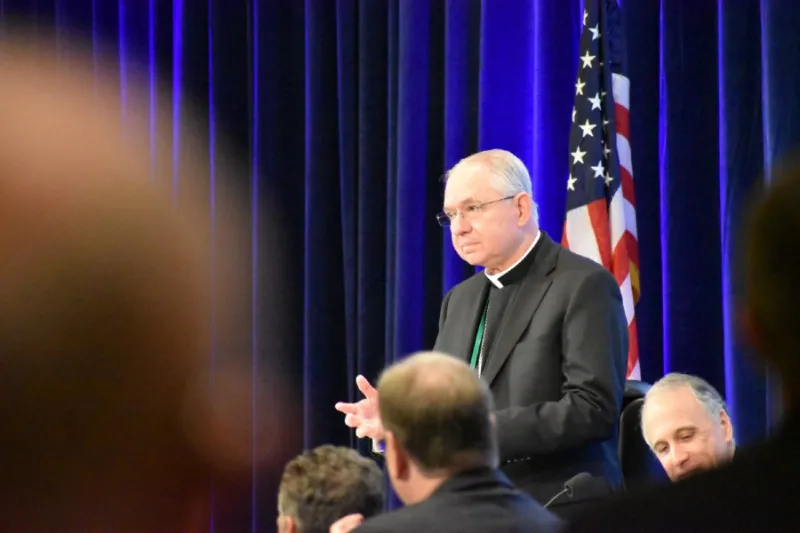
Archbishop Gomez addresses rise of ‘wokeness’, social movements in US
 Archbishop Jose Gomez of Los Angeles speaks at the USCCB’s fall meeting in Baltimore, Md., Nov. 11, 2019 / Christine Rousselle/CNA
Archbishop Jose Gomez of Los Angeles speaks at the USCCB’s fall meeting in Baltimore, Md., Nov. 11, 2019 / Christine Rousselle/CNA
Denver Newsroom, Nov 4, 2021 / 17:00 pm (CNA).
On Thursday, Archbishop Jose Gomez of Los Angeles discussed the rise of new secular ideologies and movements for social change in the United States during a virtual address to the Congress of Catholics and Public Life in Madrid.
He asserted that it is “important for the Church to understand and engage these new movements—not on social or political terms, but as dangerous substitutes for true religion.”
“Today’s critical theories and ideologies are profoundly atheistic,” Gomez said Nov. 4. “They deny the soul, the spiritual, transcendent dimension of human nature; or they think that it is irrelevant to human happiness.”
Gomez’ thesis, he said, is that the new social movements that exist in the U.S., such as “social justice,” “wokeness,” “identity politics,” “intersectionality,” or “successor ideology,” should be understood as “pseudo-religions, and even replacements and rivals to traditional Christian beliefs,” and can result in tribalism.
“They reduce what it means to be human to essentially physical qualities—the color of our skin, our sex, our notions of gender, our ethnic background, or our position in society,” he said during the address.
“With the breakdown of the Judeo-Christian worldview and the rise of secularism, political belief systems based on social justice or personal identity have come to fill the space that Christian belief and practice once occupied,” Gomez said.
Gomez approximated today’s social movements to that of Marxism and noted that they resemble other heresies found in Church history.
“Like the Gnostics, they reject creation and the body,” Gomez said. “They seem to believe that human beings can become whatever we decide to make of ourselves.”
“These movements are also Pelagian, believing that redemption can be accomplished through our own human efforts, without God,” he said.
Gomez criticized groups of people involved in social movements for prioritizing a “global civilization, built on a consumer economy and guided by science, technology, humanitarian values, and technocratic ideas about organizing society,” and that they have “no need for old-fashioned belief systems and religions.”
Gomez also noted a “shrinking space” that Christians, Church institutions, and Christian businesses are allowed to occupy with the social changes at work.
“We recognize that often what is being canceled and corrected are perspectives rooted in Christian beliefs — about human life and the human person, about marriage, the family, and more,” he said in the address.
His message, which was delivered in three parts, discussed the global movement of secularization and de-Christianization, and the impact of the pandemic; a spiritual interpretation of the social justice and political identity movements in the U.S.; and evangelical priorities for the Church.
The COVID-19 pandemic, Gomez said, accelerated the pace at which social issues are being addressed, but it was not the pandemic that caused these movements. He referenced the murder of George Floyd as a tragedy that “became a stark reminder that racial and economic inequality are still deeply embedded in our society.”
“The new social movements and ideologies that we are talking about today, were being seeded and prepared for many years in our universities and cultural institutions,” he said. “But with the tension and fear caused by the pandemic and social isolation, and with the killing of an unarmed black man by a white policeman and the protests that followed in our cities, these movements were fully unleashed in our society.”
Gomez said that, while there are unique conditions in the United States, “similar broad patterns of aggressive secularization” can be seen in Europe. He called those who are active in such movements “an elite leadership class” that “has little interest in religion and no real attachments to the nations they live in or to local traditions or cultures.”
He suggested that social movements offer an explanation for events that occur in the world, along with a sense of meaning or purpose—space previously occupied by the Christian worldview.
“Like Christianity, these new movements tell their own ‘story of salvation,’” Gomez said.
Gomez presented the Christian story of salvation in contrast to what he called the “woke story,” which “draws its strength from the simplicity of its explanations—the world is divided into innocents and victims, allies and adversaries,” he said.
“Clearly, this is a powerful and attractive narrative for millions of people in American society and in societies across the West,” Gomez said. “In fact, many of America’s leading corporations, universities, and even public schools are actively promoting and teaching this vision.”
Gomez said that people who buy into these social movements are often motivated by noble intentions and “want to change conditions in society that deny men and women their rights and opportunities for a good life.”
“We all want to build a society that provides equality, freedom, and dignity for every person,” Gomez said. “But we can only build a just society on the foundation of the truth about God and human nature.”
To address the social movements, Gomez said, the Church needs to “proclaim Jesus Christ. Boldly, creatively.”
“We should not be intimidated by these new religions of social justice and political identity,” he said. “The Gospel remains the most powerful force for social change that the world has ever seen.”
Gomez said that the Church has “been ‘antiracist’ from the beginning,” but has “not always lived up to our beautiful principles, or carried out the mission entrusted to us by Christ.”
“The world does not need a new secular religion to replace Christianity,” Gomez said. “It needs you and me to be better witnesses. Better Christians. Let us begin by forgiving, loving, sacrificing for others, putting away spiritual poisons like resentment and envy.”
Gomez said he draws inspiration from the lives of U.S. figures such as Dorothy Day and Venerable Augustus Tolton.
“Father Tolton once said, ‘The Catholic Church deplores a double slavery — that of the mind and that of the body. She endeavors to free us of both,’ Gomez said. “Today, we need this confidence in the power of the Gospel.”
He concluded his address by recognizing an “authentic religious awakening,” in the United States and asked for the continued intercession of Our Lady of Guadalupe, patroness of the Americas.




